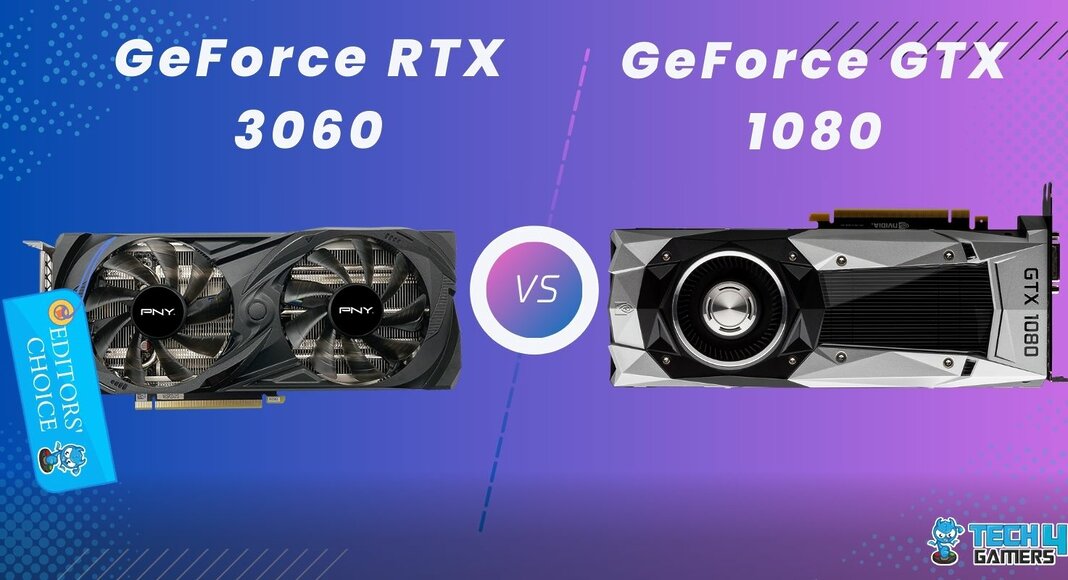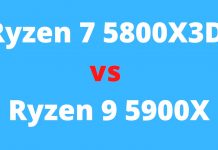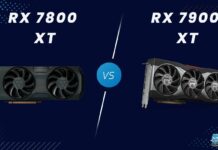Nvidia GeForce GTX 1080
Rated: 7/10
Nvidia GeForce RTX 3060
Rated: 8/10
Pros & Cons
| GPU | Pros | Cons |
|---|---|---|
| GeForce GTX 1080 | ✅Great entry level price tag | ❌Significantly higher power consumption ❌Significantly lower performance |
| GeForce RTX 3060 | ✅Significantly higher performance ✅Slightly lower power draw | ❌Relatively higher price tag |
- The RTX 3060 had an average framerate that was 30% greater in our performance testing, which was a very noticeable difference in performance.
- Power consumption was around 20% higher on the older card, leading the RTX 3060 to be significantly more power-efficient.
- The price of the GTX 1080 was much lower than that of the RTX 3060.
- For gamers on a tighter budget, the GTX 1080 makes sense as you can get it for a very low price tag, but we recommend going for the RTX 3060 if you have the budget.
Comparison Table
| Specification | RTX 3060 | GTX 1080 |
|---|---|---|
| GPU Name | GA106 (GA106-300-A1) | GP104 (GP104-400-A1) |
| Shaders | 3840 | 2560 |
| Compute Units | 30 | 20 |
| Core Clock | 1627 MHz | 1607 MHz |
| ROPs | 64 | 64 |
| TMUs | 120 | 160 |
| Memory Type | GDDR6 | GDDR5X |
| Memory Speed | 1750 MHz (14 Gbps) | 1251 MHz (10 Gbps) |
| Memory Size | 12288 MB / 12 GB | 8192 MB / 8 GB |
| Release Date | Jan 12th, 2021 | 27 May 2016 |
| Best Variants | Best RTX 3060 | - |
Architectural Differences
- VRAM: The GTX 1080 has a VRAM size of 8GB, while the RTX 3060 bumps it up to 12 GB. The memory size of the GTX 1080 touches the lower limit of what is acceptable to play modern video games.
- Bus Width: The memory bus of the GTX 1080 is wider than that of the RTX 3060, being 256-bit instead of the 192-bit bus on the newer card.
- Process Node: The RTX 3060 has reasonably modern 8nm processing nodes, while the GTX 1080 uses older, less power-efficient 16nm transistors.
- TDP: The older processing nodes on the GTX 1080 show their age with a higher TDP of 180 watts, while the RTX 3060 does not reduce it much with a TDP of 170 watts.
- Other Features: The newer RTX include dedicated RT cores of hardware-accelerated ray tracing and AI upscaling in Nvidia’s DLSS. The GTX 1080 can match the RTX 3060 in AI upscaling by using AMD’s open-source solutions, but the hardware-accelerated ray tracing cannot be matched between these two GPUs.
The 1000 series of GTX graphics cards have become darlings of the internet over the years, especially with the disappointing releases and high price hikes from recent GPUs. The RTX 3060 vs GTX 1080 comparison will compare these two cards to see whether the newer cards from Nvidia can hold a candle to what they put out in their prime.
Gaming Benchmarks – 1080p
With such large differences between the architecture of these cards, their performance can be best analyzed with real-world gaming tests. For this, we assembled a test bench that only holds the graphics card as the bottleneck, allowing them to spread their wings as much as possible.
Test System:
- Operating System: Windows 11
- CPU: Ryzen 9 5900X
- Motherboard: ASUS ROG X570 Crosshair VIII Hero
- CPU Cooler: Arctic Liquid Freezer II 420 – AIO Water Cooler
- Graphics Card: NVIDIA GeForce RTX 3060 12GB / NVIDIA GeForce GTX 1080 8GB
- SSD: XPG GAMMIX S70 BLADE 2TB NVMe
- Power Supply: ENERMAX REVOLUTION D.F. X 1050W
Assassin’s Creed Valhalla

- Our first test showed that the older card could not hold its own, with an average framerate of 43 FPS compared to the 54 FPS of the RTX 3060, accumulating to a difference of around 25%.
- The 1% lows also showed no mercy to the ancient card, with dips in performance ot around 37 FPS, while the RTX 3060 had lows closer to 44 FPS.
Crysis 3 Remastered

- Testing Crysis Remastered exaggerated the difference between these GPUs even further, with the GTX 1080 getting an average framerate of around 48 FPS, 35% slower than the 48 FPS of the RTX 3060.
- The 1% lows were around 40 FPS on the GTX card, whereas the RTX card managed a framerate of 54 FPS.
Horizon Zero Dawn

- The blood bath of our old timer continued with the RTX 3060 getting an average of 70 FPS in Horizon Zero Dawn, 23% higher than the 57 FPS average of the GTX 1080.
- As for the minimum framerates, the RTX 3060 had a performance of around 62 FPS, which was significantly greater than the 48 FPS 1% lows of the GTX 1080.
Death Stranding

- Death Stranding ran on pretty high framerates on both systems, with the GTX 1080 getting an average framerate of 83 FPS, still falling short of the 109 FPS average of the RTX 3060 by about 31%.
- As for the 1% lows, the 1080 managed dips to around 63 FPS when the going got tough, while the RTX 3060 got minimums of closer to 92 FPS.
Far Cry 6

- Using the GTX 1080, the performance returned to being “good enough” in Far Cry 6, with an average framerate of 63 FPS, still 30% slower than the 82 FPS average of the RTX 3060.
- The 1% lows were surprisingly equivalent of the two cards, with the GTX 1080 falling to around 59 FPS, while the RTX 3060 got down to minimums of around 60 FPS.
Cyberpunk 2077

- Running Cyberpunk at high settings on both of these cards proved to be a little too much, with the RTX 3060 getting an average framerate of 40 FPS, while the 1080 was 43% slower with an average performance of 28 FPS.
- The 1% lows hit around 23 FPS on the GTX 1080, while the RTX 3060 had minimums of around 33 FPS.
Days Gone

- In the post-apocalyptic world of Days Gone, the GTX 1080 managed an average framerate of only 67 FPS, while the RTX 3060 got an average of around 93 FPS. This came out to a difference of around 39%.
- As for the 1% lows, the older card had minimums of around 50 FPS, while the RTX 3060 managed lows of 68 FPS.
Red Dead Redemption 2

- The average framerate of the RTX 3060 was around 57 FPS, while the GTX 1080 managed a framerate of closer to 44 FPS in our short test. This difference accumulated to around 30%, with the RTX 3060 being in the lead.
- The GTX 1080 hit its lowest point with a framerate of 39 FPS, while the RTX 3060 managed lows of around 49 FPS.
Microsoft Flight Simulator

- Microsoft Flight Sim 2020 proved the older card to be weak once again, with an average framerate of 39 FPS, which was around 39% lower than the 55 FPS average of the entry-level RTX card.
- As for the 1% lows, the GTX 1080 had a framerate of around 34 FPS, while the RTX 3060 flew around 50 FPS.
The Witcher 3

- Finally, the last game of our testing ended with the RTX 3060 getting an average framerate of 86 FPS, 32% higher than the GTX 1080, which sat with an average framerate of 65 FPS.
- The 1% lows were around 53 FPS on the GTX 1080, while the RTX 3060 rounded off our comparison with lows of around 72 FPS.
Overall Gaming Performance
| Featured | RTX 3060 | GTX 1080 |
|---|---|---|
| Average FPS | 74 📈 | 54 📈 |
| %1 lows | 59 📉 | 45 📉 |
| Winner: Nvidia's RTX 3060 | ||
The RTX card exhibited a significant performance advantage over the GTX 1080, with an approximately 32% higher average framerate. Regarding 1% lows, the GTX 1080 experienced more noticeable stuttering. The GTX 1080 struggles to comfortably handle gaming at 1080p with max settings.
Power Consumption
| Game | GTX 1080 (W) | RTX 3060 (W) |
|---|---|---|
| Assassin's Creed Valhalla | 181 | 127 |
| Crysis 3 Remastered | 183 | 149 |
| Horizon Zero Dawn | 184 | 129 |
| Death Stranding | 187 | 161 |
| Far Cry 6 | 184 | 163 |
| Cyberpunk 2077 | 183 | 174 |
| Days Gone | 185 | 174 |
| Red Dead Redemption 2 | 185 | 145 |
| Microsoft Flight Sim | 186 | 152 |
| The Witcher 3 | 171 | 141 |
| Average Power Consumption | 182.9 | 151.5 |
| Winner: Nvidia's GeForce RTX 3060 | ||
Not only was the performance higher on the newer card, but it also showed remarkably lower power consumption. On average, our tests showed that the RTX 3060 consumed around 21% less power than the GTX 1080, marking it as much better in terms of power efficiency.
Price And Value
| GPU | MSRP | Current Price (Used) |
|---|---|---|
| GeForce GTX 1080 | 💲599 | 💲140 |
| GeForce RTX 3060 | 💲329 | 💲259 |
| Price Difference | 82% | 85% |
Both processors had very different price points at the start of their life cycles. The case is still true today, but the GTX 1080 is cheaper by far. Do note that the true value of these cards shines through in the used market, so we will evaluate them as a whole based on this price.
Which One Should You Get?
GeForce GTX 1080: The aging GTX 1080, once popular, now struggles with modern AAA titles beyond 1080p. While budget-friendly, its higher power consumption can be challenging for smaller power supplies.
GeForce RTX 3060: Though it is not seen with rose-tinted glasses like the GTX cards, the RTX 3060 proved to be quite a performer in our gaming tests. It handled games at 1080p with elegance at high settings, making it the card we would recommend for anyone who can stretch their budget.
To conclude, the love and nostalgia for the GTX 1080 is not completely unwarranted, but it has begun to go out of fashion with the graphics demands of recent games rising.
Frequently Asked Questions
Being a relatively weak GPU, an i5-8500 or a Ryzen 5 2600 would suffice to remove any processor bottleneck from your gaming rig.
The graphical demands of new titles reduce the capabilities of the RTX 3060, but you can get away with turning down a few settings at 1080p.
The GTX 1080 uses a PCIe 3.0 interface.
More From GTX 1080
More From RTX 3060
Thank you! Please share your positive feedback. 🔋
How could we improve this post? Please Help us. 😔
[Comparisons Expert]
Abdemanaf is a skilled creative writer who has been honing his craft since 2011. While initially working in different fields, he found a passion for technology and has been exploring the tech world since early 2015. Over the years, he has developed an in-depth knowledge of the latest tech trends and product offerings by various companies.
Abdemanaf’s writing reflects his analytical mindset and ability to think critically. He has a knack for breaking down complex technical information into easily digestible pieces, making his articles engaging and accessible to readers from all backgrounds. In February 2022, he joined Tech4Gamers as a blog and product comparison writer, where he has been able to hone his skills further.
As a writer, Abdemanaf is dedicated to staying up-to-date with the latest technological advancements and trends, enabling him to provide readers with the most relevant and accurate information. He is always eager to learn more and is constantly seeking new challenges to improve his skills.
Get In Touch: manaf@tech4gamers.com






![Core i5-13500 Vs Ryzen 5 7600 [We Tested 8 Games]](https://tech4gamers.com/wp-content/uploads/2023/05/CPU-Comparison-Template-NEW-218x150.jpg)
![RTX 2070 Vs RTX 3070 Ti [We Tested 8 Games]](https://tech4gamers.com/wp-content/uploads/2023/06/GPU-Comparison-Template-NEW-2-1-218x150.jpg)
Feedback By: